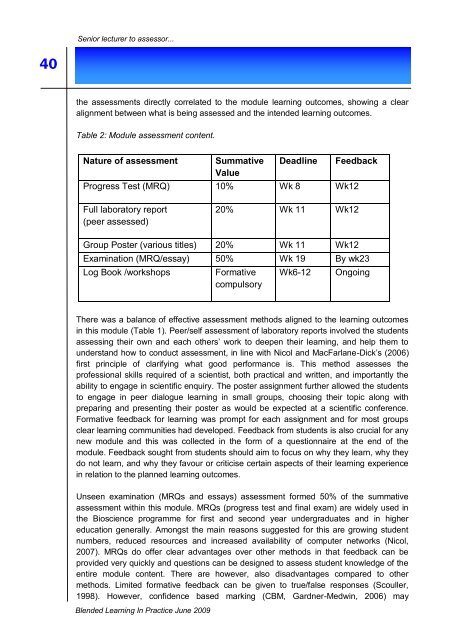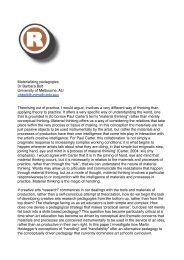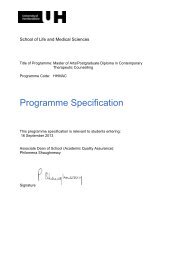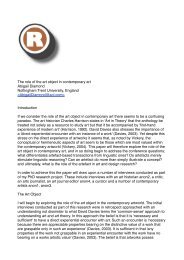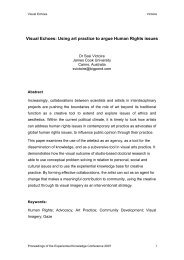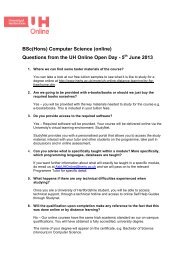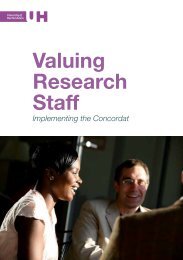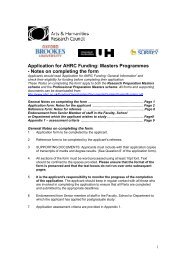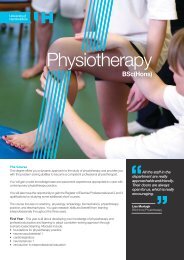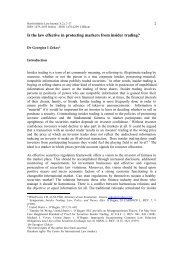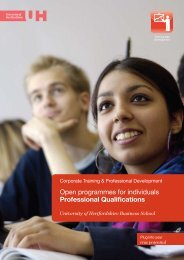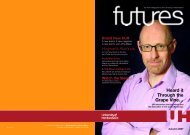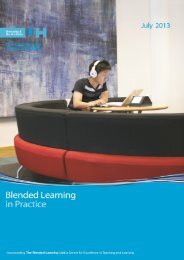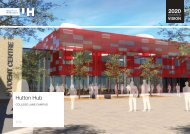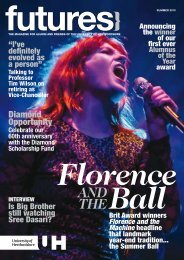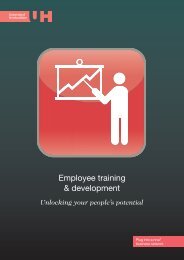June 2009 - University of Hertfordshire
June 2009 - University of Hertfordshire
June 2009 - University of Hertfordshire
Create successful ePaper yourself
Turn your PDF publications into a flip-book with our unique Google optimized e-Paper software.
Senior lecturer to assessor...<br />
40<br />
the assessments directly correlated to the module learning outcomes, showing a clear<br />
alignment between what is being assessed and the intended learning outcomes.<br />
Table 2: Module assessment content.<br />
Nature <strong>of</strong> assessment<br />
Summative<br />
Value<br />
Deadline<br />
Feedback<br />
Progress Test (MRQ) 10% Wk 8 Wk12<br />
Full laboratory report<br />
(peer assessed)<br />
20% Wk 11 Wk12<br />
Group Poster (various titles) 20% Wk 11 Wk12<br />
Examination (MRQ/essay) 50% Wk 19 By wk23<br />
Log Book /workshops<br />
Formative<br />
compulsory<br />
Wk6-12<br />
Ongoing<br />
There was a balance <strong>of</strong> effective assessment methods aligned to the learning outcomes<br />
in this module (Table 1). Peer/self assessment <strong>of</strong> laboratory reports involved the students<br />
assessing their own and each others‟ work to deepen their learning, and help them to<br />
understand how to conduct assessment, in line with Nicol and MacFarlane-Dick‟s (2006)<br />
first principle <strong>of</strong> clarifying what good performance is. This method assesses the<br />
pr<strong>of</strong>essional skills required <strong>of</strong> a scientist, both practical and written, and importantly the<br />
ability to engage in scientific enquiry. The poster assignment further allowed the students<br />
to engage in peer dialogue learning in small groups, choosing their topic along with<br />
preparing and presenting their poster as would be expected at a scientific conference.<br />
Formative feedback for learning was prompt for each assignment and for most groups<br />
clear learning communities had developed. Feedback from students is also crucial for any<br />
new module and this was collected in the form <strong>of</strong> a questionnaire at the end <strong>of</strong> the<br />
module. Feedback sought from students should aim to focus on why they learn, why they<br />
do not learn, and why they favour or criticise certain aspects <strong>of</strong> their learning experience<br />
in relation to the planned learning outcomes.<br />
Unseen examination (MRQs and essays) assessment formed 50% <strong>of</strong> the summative<br />
assessment within this module. MRQs (progress test and final exam) are widely used in<br />
the Bioscience programme for first and second year undergraduates and in higher<br />
education generally. Amongst the main reasons suggested for this are growing student<br />
numbers, reduced resources and increased availability <strong>of</strong> computer networks (Nicol,<br />
2007). MRQs do <strong>of</strong>fer clear advantages over other methods in that feedback can be<br />
provided very quickly and questions can be designed to assess student knowledge <strong>of</strong> the<br />
entire module content. There are however, also disadvantages compared to other<br />
methods. Limited formative feedback can be given to true/false responses (Scouller,<br />
1998). However, confidence based marking (CBM, Gardner-Medwin, 2006) may<br />
Blended Learning In Practice <strong>June</strong> <strong>2009</strong>


